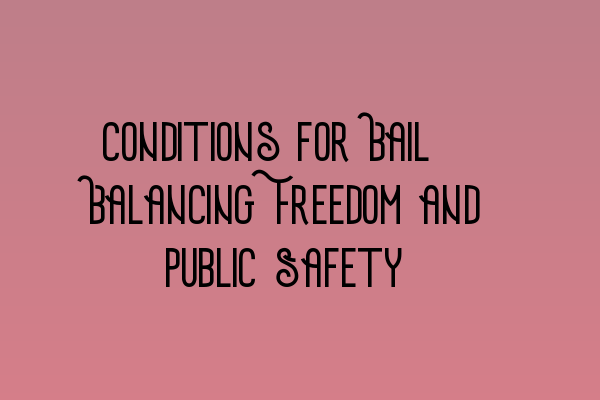Conditions for Bail: Balancing Freedom and Public Safety
When it comes to criminal law, one of the most crucial aspects is determining whether an individual should be granted bail or detained in custody pending trial. Bail is the temporary release of an accused person, with or without conditions, while they await their court proceedings. The conditions imposed on bail are crucial in maintaining a delicate balance between an individual’s right to freedom and the concern for public safety.
Before diving into the various conditions for bail, it is essential to understand the purpose of bail itself. Bail serves as a means to ensure the presence of the accused in court, preventing potential flight risks. At the same time, it recognizes the right to liberty of an individual, presuming innocence until proven guilty.
Conditions for Bail
When determining bail conditions, the court takes into consideration several factors, such as the severity of the crime, the accused’s criminal record, ties to the community, and the likelihood of reoffending. The following are some common conditions imposed on bail:
- Reporting to the Police: The accused may be required to regularly report to the local police station to prove compliance with their bail conditions.
- Residence: A specific address or region may be specified where the accused must reside while on bail.
- Electronic Monitoring: In cases where a higher level of monitoring is necessary, the accused may be required to wear an electronic monitoring device.
- Travel Restrictions: If there is a concern that the accused might flee the country, travel restrictions may be imposed, preventing them from leaving a designated area or the country altogether.
- Curfew: To ensure compliance with bail conditions, a curfew may be set, restricting the accused’s movements during specific hours.
- Non-Contact Orders: In cases involving alleged victims or witnesses, the accused may be prohibited from contacting certain individuals directly or indirectly.
- Financial Surety: The requirement to provide a financial guarantee, often in the form of a sum of money or valuable assets, to secure the accused’s appearance in court.
Each case is unique, and the court will tailor the bail conditions based on the individual circumstances. The purpose of imposing conditions is to strike a balance between protecting the public and granting the accused their constitutional right to liberty.
It is essential to note that failing to comply with bail conditions can have serious consequences, including the revocation of bail and potential further criminal charges. Therefore, it is crucial for individuals on bail to adhere strictly to the conditions set forth by the court.
Conclusion
Conditions for bail play a vital role in the criminal justice system, striking a delicate balance between an individual’s right to freedom and the need for public safety. By imposing appropriate conditions, the court ensures that the accused will appear for court proceedings while safeguarding the interests of the community. If you require more information regarding bail conditions or other aspects of criminal law, SQE Criminal Law & Practice Law UK is here to assist you.
For further reading, check out our related articles:
- SQE 1 Practice Exam Questions
- SQE 1 Practice Mocks FLK1 FLK2
- SQE 2 Preparation Courses
- SQE 1 Preparation Courses
- SRA SQE Exam Dates
